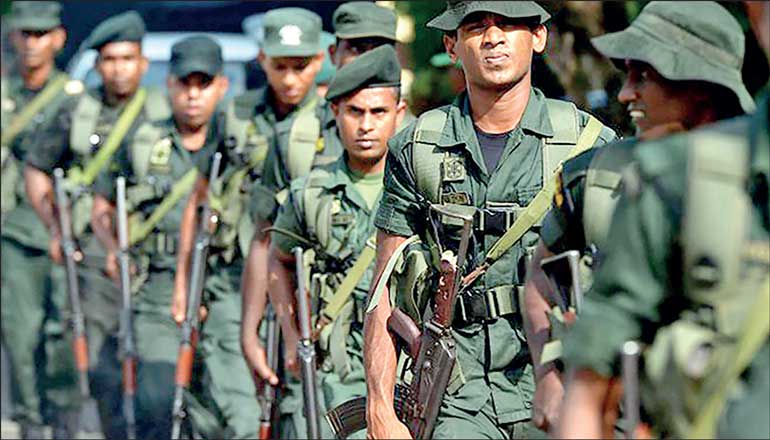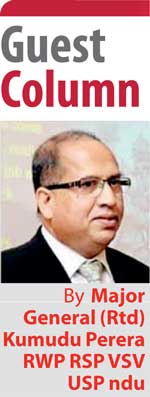Sunday Feb 15, 2026
Sunday Feb 15, 2026
Friday, 23 May 2025 00:20 - - {{hitsCtrl.values.hits}}

Any officer appointed to the crucial position of Army Commander should be afforded a reasonable period to deliver meaningful outcomes for the institution
 Talking lightly on the strategically important subject of a nation’s security strikes me in two significant ways. Firstly, it reveals how seriously a strategically heavy subject as national security is looked at by the State. Secondly, it highlights a significant vacuum of knowledge on the subject within the State apparatus.
Talking lightly on the strategically important subject of a nation’s security strikes me in two significant ways. Firstly, it reveals how seriously a strategically heavy subject as national security is looked at by the State. Secondly, it highlights a significant vacuum of knowledge on the subject within the State apparatus.
National security is a subject that must be discussed by individuals who are well-versed in the field or who have the necessary experience and maturity to handle matters of national security. I believe I am somewhat qualified to share my perspective on the subject, having served for over 35 years in the infantry and having been wounded twice on the battlefield, neither of which were self-inflicted.
Before delving into the crucial matter of national security, I intend to share my views on an equally important subject, that is the tenure of an Army Commander. The current Government’s stance on service extensions for Commanders is both strategically significant and commendable (https://www.youtube.com/watch?v=pzCuyb31p0c). However, no newly appointed Commander should be deprived of a reasonable period in which to contribute meaningfully to the advancement of the organisation. Therefore, minimum one extension is recommended, specifically to those who reach the age of 55 within months of their appointment, to enable such progress.
The rationale behind the recommendation to grant an extension lies in what entails in the role and task of an Army Commander (responsibilities) as well as the age bracket in to which potential Commanders fall into. At the time I hung up my boots, role and task of an Army Commander was stipulated as “responsible for the Command, training, control, operational deployment, and administration of the Army”.
Responsibilities of an Army Commander
Although the responsibilities of an Army Commander are summarised in those few words, the scope of work they encompass is immense, requiring meticulous, deliberate, and exhaustive planning and execution. Senior officers who ascend the ranks through the crucible of disciplined progression tempered by the rigors of battlefield command and the burdens of peacetime governance definitely possess a keen appreciation for the immense operational weight these duties entail, and the relentless passage of time demanded to see them through with precision and resolve.
It is the duty and indeed the bounden and undeniable duty of responsible officials to advise and educate the leadership of the state that most officers appointed to the position of an Army Commander have only a few months of residual service remaining. This raises a crucial question: can an Army Commander truly be held accountable for meeting expectations within such a limited timeframe?
There are certain important factors for the Government to consider before reaching such a conclusion. Firstly, a study of how other Armies in neighbouring nations determine the tenure of their Army Commanders is vital, because as per my knowledge, at the time of my retirement, the retirement ages for Army Commanders in India, Pakistan, and Bangladesh were 62, 60, and 58 years, respectively. There are solidly strong and valid reasons for these timeframes to be given, because Governments of those countries have a good understanding of the responsibilities vested on an Army Commander.
Reasonable tenure
 Recently, the President declared his intention to transform the existing war-winning professional Army into an even more proficient force. If he is even slightly serious about this commitment, he should reconsider whether changing Army Commanders every 9-10 months is the right decision or whether a reasonable tenure should be granted to allow a Commander to implement meaningful and significant change for the development of the organisation.
Recently, the President declared his intention to transform the existing war-winning professional Army into an even more proficient force. If he is even slightly serious about this commitment, he should reconsider whether changing Army Commanders every 9-10 months is the right decision or whether a reasonable tenure should be granted to allow a Commander to implement meaningful and significant change for the development of the organisation.
Among a plethora of other important responsibilities, an Army Commander must also plan and implement redeployment and restructuring, which are two critical matters.
Last strategic and tactical redeployment was probably the one done in year 2009, as we know, under the then Army Commander, General Sarath Fonseka with his able ground Commanders, after the conclusion of the war. Since then, many changes have crept in to the numbers, system, situation and geopolitics. Hence, a redeployment is timely and vital at this juncture to maintain a high level of efficiency as well as to cover all aspects of national security.
A comprehensive restructuring of the entire Army is critically needed to maintain and enhance the professionalism the Army achieved in the period of 2009. It should not be merely an exercise of eyewash as done presently. Such restructuring should not be restricted or limited to manpower in infantry regiments, as is happening now. A productive or effective restructuring should include all institutes, equipment, infrastructure, resources as well as training and R & R (welfare). The effectiveness of a proper restructuring, once completed, should be felt by the security apparatus, all members and the State. It should boost the image of the State, the organisation as well as elevate the morale of the members. As a significant outcome, it should contribute positively to the national economy as a key factor.
Redeployment and restructuring
One might perceive the terms ‘redeployment’ and ‘restructuring’ as just two simple words, especially as, recently someone questioned whether Sri Lanka still needs such a large Army at present. What he failed to grasp is that such questions are not answered on media dramas, but only after months of careful deliberation, strategic planning, and rigorous operational exercises. The work embedded in those two words are immense. They require long hours of research, planning, deliberation, practical implementation, and, most importantly, an analysis of both positives and negatives to make necessary adjustments.
No individual possesses a superpower to implement and complete all of this within just 9 to 12 months. This is not a matter the State can afford to take lightly. The recent skirmish between our two neighbouring countries should serve as a clear wake-up call for our leaders to give serious thought to the defenders of the nation. Although we are a unique nation that does not share land borders with any other state, (only the future will determine the length of time we will enjoy that sovereignty), our Armed Forces must maintain the highest possible level of state of readiness to protect the territorial integrity and the sovereignty that is blessed upon us. As the saying goes: “In the absence of war, prepare for war”, not that anyone wishes for a war.
The point I am trying to convey is that any officer appointed to the crucial position of Army Commander should be afforded a reasonable period to deliver meaningful outcomes for the institution. Ultimately, the safety and security of the nation hinges on what he is able to accomplish during his tenure.
Professionalism, skills, and productivity of a force will deteriorate rapidly when timely sensitive changes are not implemented at the right time and at the appropriate levels. That, coupled with external environmental or antisocial influences, will have a severe negative impact, potentially destroying both the psychological and physical abilities of soldiers.
Delaying developments and improvements
In a fast-evolving defence landscape, delaying such developments and improvements will lead to severe consequences. This represents a significant risk to national security and the safety of the nation’s people. Having short-term Commanders will not provide the environment necessary for such changes, whether in terms of personnel, materials, or machinery.
Discontinuing with granting unprecedented unlimited terms of extensions, by the current regime, should be applauded as such extensions result in only more negatives than any positives to an organisation. However, it is imperative that the nation’s leadership provides a reasonable and fair period of service to the officer appointed as the Commander, allowing them sufficient time to plan and implement necessary and compelling changes.
In continuing the discussion on national security, as mentioned in the second paragraph, it is my view that no leader or individual in a position of influence should make uninformed or careless remarks without a full understanding of the depth and complexity of the subject. In the field of Defence and Security, there are well-established textbooks that address both traditional and non-traditional security threats. Activities such as drug trafficking and connected underworld operations are considered as non-traditional security threats. Regardless of the type or magnitude, every security threat has a direct impact on a nation’s overall security.
Therefore, when a Head of State asserts that national security remains unaffected in the midst of an ongoing, unabated, and unceasing wave of killings on the streets, it not only exposes a profound fundamental lack of understanding of national security principles but also reflects a dangerous detachment from the realities confronting the nation.
It is hoped that matters outlined above will receive and compel the immediate attention of those entrusted with the leadership of this nation, leaders who are dutybound to protect the sovereignty, territorial integrity and security of our island state. It is not merely a responsibility, but an obligation to ensure that our Armed Forces are provided with the support, stability, authority and most importantly the recognition they deserve to remain strong, ready, and uncompromising in the face of evolving threats and during natural calamities.
(The writer retired as the Deputy Chief of Staff of the Sri Lanka Army after an unblemished and an illustrious career of almost 36 years. He has served the nation through all conflicts since 1985 and participated in almost all ground offensive operations during conflict times as well as heart and mind operations during peace time. He is a patriot who shed blood twice in the battlefront to protect the sovereignty of the nation. He was a renowned ambassador of peacebuilding and reconciliation.)